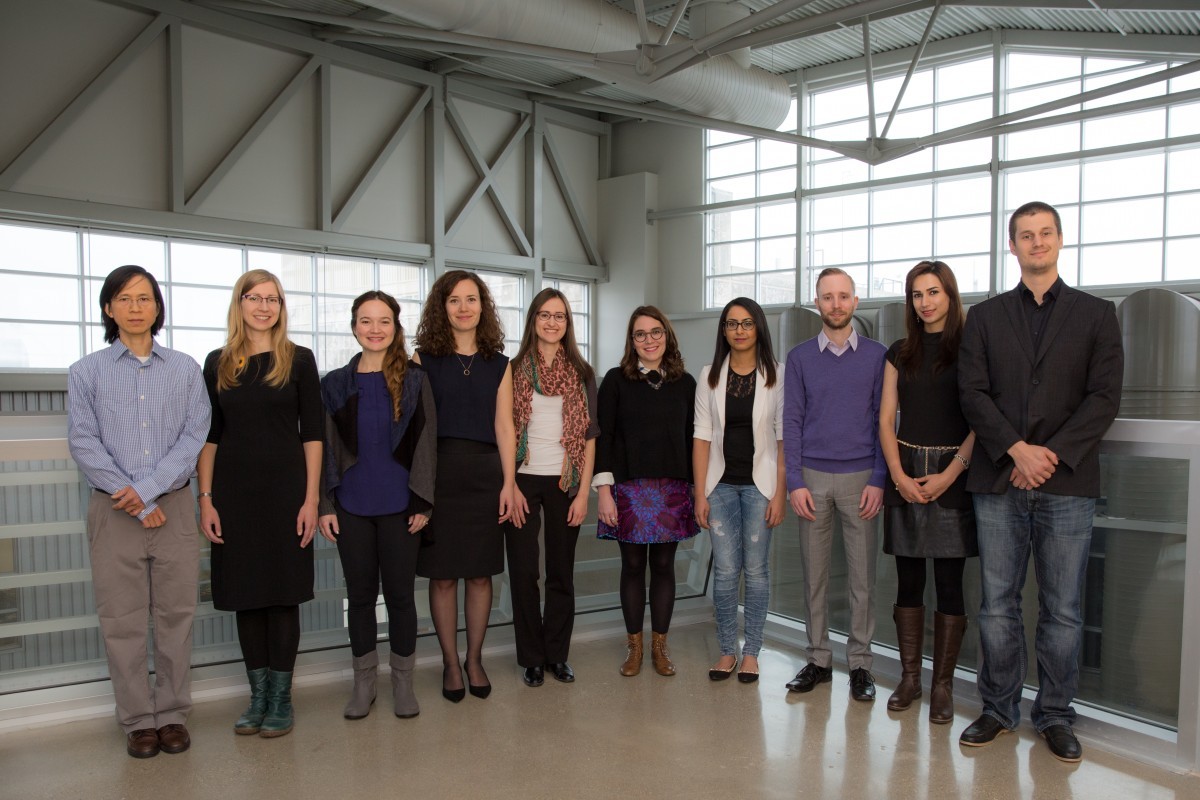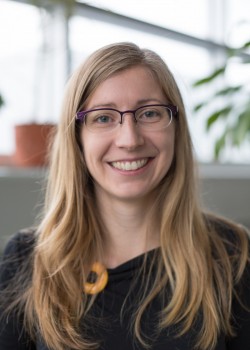
2015 Wu Scholars
Stoking passion within graduate students
Wu Scholar, Melanie Dennis Unrau says the financial support allows her to focus on two priorities: schoolwork and family
Fact: The University of Manitoba has roughly 3,800 graduate students.
Fact: More than half of the graduate students who decline an offer to study at the U of M do so because they receive better financial incentives from competing universities.
Fact: Without aggressive investment, graduate students will seek opportunity, discover success, share knowledge, contribute to their communities, and generate wealth – elsewhere.
It’s for the above reasons that graduate student support is a pillar of the university’s Front and Centre campaign, and why awards like the Sir Gordon Wu Graduate Student Scholarship are so important.
“The Wu Scholarship offers me flexibility and financial support to make sure my dissertation project is as well planned, researched, and executed as I want it to be,” says PhD student Melanie Dennis Unrau, SSHRC Canada Graduate Scholar, Department of English, Film, and Theatre.
Dennis Unrau is one of 11 students awarded the Wu Scholarship this year. These 11 new Wu Scholars join 15 fellow graduate students who have received the award since it was established in 2013 through a $1 million gift from Sir Gordon and Lady Ivy Wu.
The Wu Scholarship is awarded annually to students who have demonstrated intellectual ability and academic accomplishments and its impact is felt deeply by those who receive the scholarship.
“Financial support through the Wu Scholarship allows me to focus on my top two priorities: my schoolwork and my family,” says Dennis Unrau, who points to the importance of balance and self-care in her continued success.
While Sir Gordon Wu studied at the U of M for just a year in 1953 before transferring to Princeton University, he has maintained a relationship with the university, receiving an honorary degree in 2012.
“I’m really grateful to an individual who would find it in their heart to still be giving back these many years later after having spent such a short time at this university,” says 2014 Wu Scholar Patlee Creary, PhD candidate, Peace and Conflict Studies. “I really hope that as I move into my own career I have the presence of mind to still keep thinking of the university as an alumna.”
Hear from Wu Scholar Patlee Creary and Asper School of Business alumnus Sam Davidson about the importance of student support:
2015 Wu Scholars
Daniel Rea – PhD Candidate in Computer Science
Tran Nguyen – PhD Candidate in Plant Science
Matthew Quesnel – PhD Candidate in Psychology
Melanie Unrau – PhD Candidate in English, Film & Theatre
Dustin Kehler – PhD Candidate in Applied Health Sciences
Leigh McClarty – PhD Candidate in Community Health Sciences
Sheila Novek – PhD Candidate in Community Health Sciences
Jennifer Hedges – PhD Candidate in Social Work
Mamneed Manghera – PhD Candidate in Immunolgy
Farahnaz Hajipour – PhD Candidate in Biomedical Engineering
Michelle Keller – PhD Candidate in French
2014 Wu Scholars
Lindsay Aboud – PhD Candidate in Medical Microbiology
Jaseer Ahmed – PhD Candidate in Physics & Astronomy
Ka-Yee Grace Choi – PhD Candidate in Immunology
Patlee Creary – PhD Candidate in Peace & Conflict Studies
Erica Franzmann – PhD Candidate in Physics & Astronomy
Matthew Guzzo – PhD Candidate in Biological Sciences
Maia Simone Kredentser – PhD Candidate in Psychology
Katelin Neufeld – PhD Candidate in Psychology
Kendra Lee Rieger – PhD Candidate in Nursing
Tamara Sucharyna – PhD Candidate in Psychology
2013 Wu Scholars
Cassidy Erdely – PhD Candidate in Biological Sciences
Warren Blunt – PhD Candidate in Biosystems Engineering
Andrew Denisuik – PhD Candidate in Medical Microbiology
Khashavar Hamidzadeh – PhD Candidate in Linguistics
Steven Howell – PhD Candidate in Electrical and Computer Engineering
Read our entire Q & A with Melanie Dennis Unrau below:
What did you think when you first were told you received the award?
I was very surprised to hear that I had been offered a Sir Gordon Wu Scholarship—it’s not an award that you apply for, so the letter was a complete shock. I have already been so well supported by my department (Margaret H. Tyler Award in English), the university (University of Manitoba Graduate Fellowship), the province (Manitoba Graduate Scholarship), and the Social Sciences and Humanities Research Council (Canada Graduate Scholarship). I didn’t expect anything more. Yet, at the moment I heard about the scholarship, it brought a big sense of relief. There is quite a bit of pressure to stay on track in a PhD program, and that’s important, but I’m also a careful and meticulous person. I like to make sure I’m getting things right and thinking things through. The Wu Scholarship offers me flexibility and financial support to make sure my dissertation project is as well planned, researched, and executed as I want it to be.
What is the impact, for you, of getting this kind of financial support?
Financial support through the Wu Scholarship allows me to focus on my top two priorities: my schoolwork and my family. I have two children, 11 and 8. It means that I don’t have to worry about money, so I only take on extra projects like research jobs or creative projects if they are very closely related to my own research and writing. I plan to continue to use my funding to travel for conferences, research, and study with internationally known scholars in my field. For example, this summer I travelled to Utrecht University in the Netherlands to take a course on the Posthuman with feminist-Deleuzian philosopher Rosi Braidotti, and in 2014 I studied “Poetry after Globalization” with Jeff Derksen at Simon Fraser University in B.C. Having this financial support also means that once I finish my first candidacy exam in December, my family and I will have some time to recuperate and reconnect at a cozy getaway in the Whiteshell. I know self-care and balance are very important to my continued success as a student. And one last thing about what the Wu Scholarship means to me: it shows that my university supports and acknowledges my hard work and achievements, and that motivates me to keep on going.
What do you want your education at the U of M to help you achieve in your life?
At the University of Manitoba I have opportunities to work with some really excellent established and emerging scholars in literary and cultural studies, including the two Canada Research Chairs who are working with me on my candidacy exams—Diana Brydon of the Centre for Globalization and Cultural Studies and Warren Cariou of the Centre for Creative Writing and Oral Culture—as well as the accomplished writer and scholar of Canadian poetry Alison Calder. I am also grateful for connections with Native Studies, Peace and Conflict Studies, Fine Arts, the Institute for the Humanities, the Alternate Histories research cluster, the Affect Project, the University of Manitoba Press, Mosaic journal, and the ongoing dialogue about human rights on our campus and in our city. I am very well positioned to research and write an innovative dissertation on the role of collaborative poetry projects in recent social movements like the anti-pipelines movement, Occupy, and Idle No More. Most of the time I live in the moment, taking in all of my favourite things about doing academic work, but I also have hopes for what comes after the PhD. I have many passions and interests, and I hope there will be more opportunities for research and teaching, for engaging in social justice work, for collaborating with other literary scholars and artists, for continuing my work as an editor, and for writing and publishing more of my own poetry.
Research at the University of Manitoba is partially supported by funding from the Government of Canada Research Support Fund.







